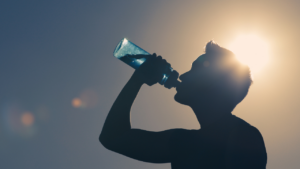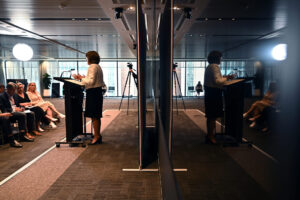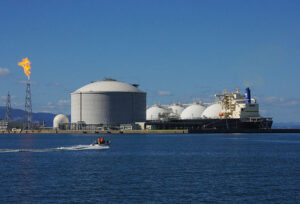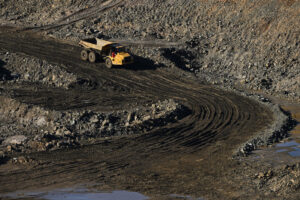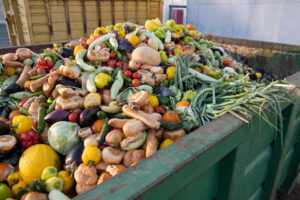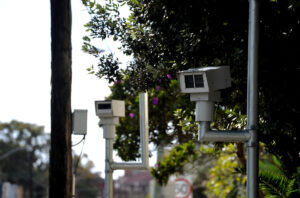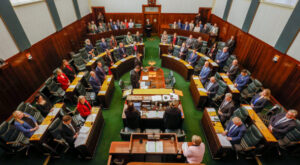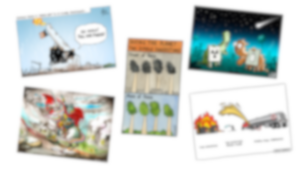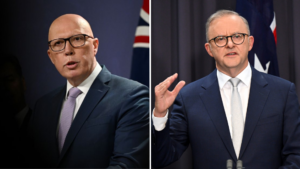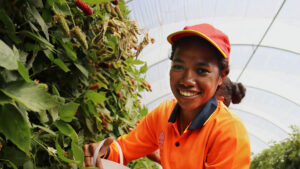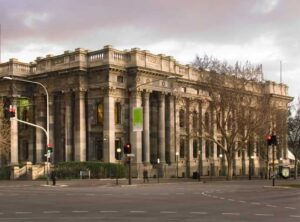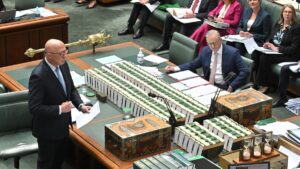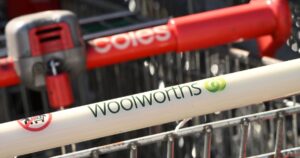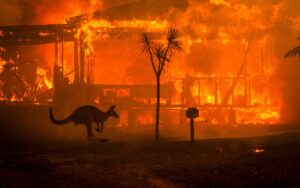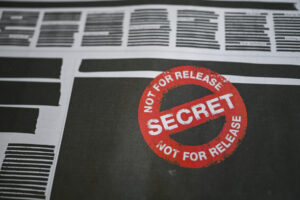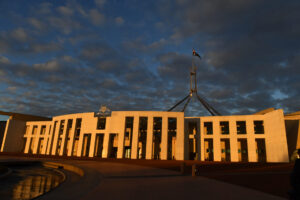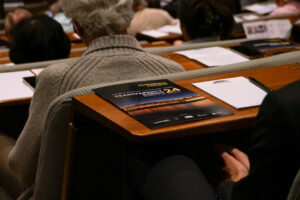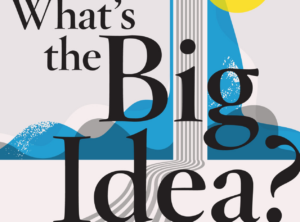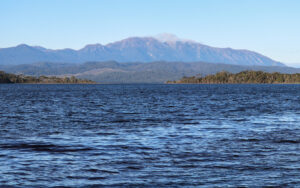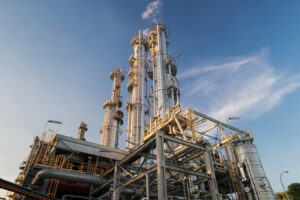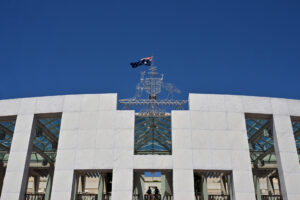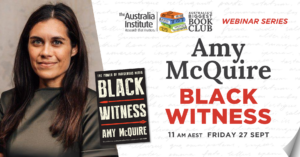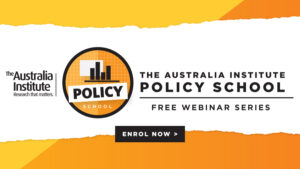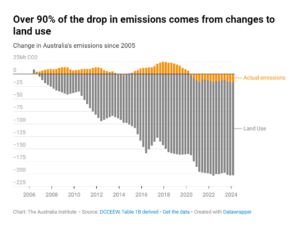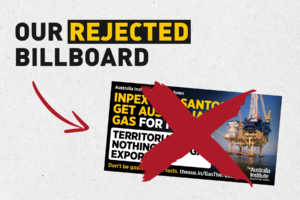Articles
December 2024
Mapping how extreme heat exacerbates inequality
Extreme heat is the number one cause of weather-related illness and death in all parts of Australia, except Tasmania. Older, poorer, and sicker people are more vulnerable to the effects of extreme heat. Our new report identifies the locations around Australia in which the greatest number of vulnerable people will be affected by extreme heat. Targeting these areas for support will ensure the greatest number of vulnerable people are helped during periods of extreme heat.
In worrying about productivity growth, the RBA has strayed beyond its remit
It’s official: the Reserve Bank of Australia will have its board split in two, and two new appointees will join the reconfigured monetary policy board, whose job it is to make decisions on interest rates. The move was recommended by an independent review panel in 2023. The new members of the monetary policy board, one
Japan and Australia’s gas-fuelled obsession endures under Asia Zero Emission Community
Japan and Australia enjoy a long-standing relationship when it comes to energy trade. According to Japan, “(t)he energy and resources sector is the bedrock of the Japan-Australia economic partnership”. But the two countries’ efforts to decarbonise their economies to reach their respective emissions reduction targets have been threatening to jeopardise this gas-fuelled obsession. Japan has
Coal royalties are a tiny part of the NSW Budget
The people of Australia collectively own all the resources under the ground. This means that the coal in NSW is the property of the Australian people too. Because of this, mining companies have to pay the NSW Government a “royalty” if they want to dig up and sell coal. Royalties are not taxes. They are
Gardening for a healthier life and a healthier planet
Australians are hungry to grow their own food and the reasons are simple: growing your own food is healthier and better for the planet. Whether it’s herb pots on a windowsill or a rambling backyard veggie patch, Australians say that growing some of their own food makes them feel better, eat better and tread lighter on the planet.
Australia’s traffic fine system is unfair – is it time to implement proportional fines?
How is Australia’s system unfair? If you get caught speeding in Australia, you will be fined with a flat-rate traffic fine. Exceeding the speed limit by 12km/h in New South Wales earns you a $361 fine, whether you are on government benefits or a billionaire. This is not a fair system. What about the principle:
Tasmanian MPs rate of pay
Tasmanian MPs have not had a pay increase since 2018.
November 2024
Shortlist for the Australia Institute Climate Cartoon Award
We are delighted to sponsor this year’s Australia Institute Climate Cartoon Award, organised by the Australian Cartoonists Association. The winner will be announced on Saturday, 30th November at the 40th Annual Stanleys Awards at Old Parliament House. This year’s shortlisted cartoons are as follows: Megan Herbert Judy Horacek Glen Le Lievre David Pope David Rowe
Eight things you need to know about the Government’s plan to change Australian elections
And eight ideas to improve it
Pacific Labourers overtaxed and exploited in Australia
The Pacific-Australia Labour Mobility (PALM) scheme is often presented as being beneficial to all parties—Australia, Pacific workers, and those workers’ home countries. In reality, the benefits are weighted in favour of Australia.
Secretive and rushed: Unpacking SA’s new electoral laws
As dramatic changes to South Australian electoral law pass the house of review (Legislative Council), voters could be forgiven for wondering “what just happened?”
A week ago, no one had seen the government’s revised Electoral (Accountability and Integrity) Amendment Bill 2024. Now, it’s set to become law.
Amy Remeikis and the Director of The Australia Institute’s Democracy and Accountability Program, Bill Browne, unpack how we got here … and what should happen next.
A Time for Bravery
Welcome to The Australia Institute, Amy Remeikis
Amy is one of Australia’s most respected political observers.
She proudly swims against the tide of spin which swirls around the Canberra bubble.
This is her first column for The Australia Institute.
Corporate profits increase inflation | Fact Sheet
The prices of many goods and services have increased dramatically across Australia since 2021. This has resulted in hardship for many households—along with $100 billion in increased profits for major companies. These corporate profits have been a key factor driving inflation.
Climate change driving insurance premiums, adding to cost of living pressure and inflation
Climate change is driving an enormous increase in the cost of insurance with premiums massively outpacing price rises for nearly all other goods and services, making it unaffordable for many Australians.
The role of the whistleblower in pursuit of climate integrity
Whistleblowers are critical to addressing the climate and biodiversity crises.
October 2024
There is no such thing as a safe seat | Fact sheet
A notable trend in Australian politics has been the decline of the share of the vote won by both major parties at federal elections. One effect of this is that there are no longer any safe seats in Australian politics: minor parties and independents win more “safe” seats than they do “marginal” ones. The declining
Six ideas to fix Australia’s secrecy problem
The Australia Institute’s inaugural 2024 Transparency Summit brought together experts, whistleblowers and those working to ensure the interests of all Australians are represented in our policy-making process. We are sleepwalking towards disaster when we accept the idea that the more secret we are about decision-making, the safer we’ll be. – Richard Denniss, Executive Director of
A lack of transparency and integrity lies near the heart of every political issue facing Australia.Super-powered nukes: Is your superannuation funding weapons of mass destruction?
When you choose your superannuation fund, you’re probably not thinking about weapons of mass destruction. But it might surprise you to learn that if you’re with one of Australia’s largest funds, your money is going into the production of nuclear weapons. Research published last month by Quit Nukes and The Australia Institute found that 13
Australia Institute Launches Publishing Imprint
The Australia Institute is launching its own publishing imprint, Australia Institute Press.
Australian super funds investing in nuclear weapons companies
How would you feel if your super was invested in nuclear weapons companies? Well, in Australia, there’s a high chance it is.
Inaction “not an option” after damning report into the state of Tasmania’s environment
On Saturday 19 October, 20 organisations, including the Australia Institute, published an open letter calling on the Rockcliff Government to acknowledge the damning findings from Tasmania’s 2024 State of the Environment Report and commit to reversing the state’s environmental declines.
Australia’s gas policy mess | Fact Sheet
Gas companies and the Australian government claim that Australia faces gas shortages, while multinational exporters are shipping record volumes of gas out of Australia. The prices that Australians pay for gas have gone up, while government revenue from gas production has gone down. What’s going on?
How parliaments share power | Fact Sheet
Parliaments are made to share power.
September 2024
Australia is a low-tax country | Fact sheet
Australia is one of the lowest-taxing countries in the developed world. While it is sometimes suggested that Australian governments spend too much, the reality is that Australia raises very little tax revenue compared to similar countries. Insofar as Australian governments have a problem balancing revenue and spending, that problem lies in the level of revenue
Extract: Black Witness by Amy McQuire
This is an extract from Black Witness by Amy McQuire, published by University of Queensland Press.
Introducing Policy School!
Join The Australia Institute’s Policy School to learn from experts about key public policy issues and gain tools to effectively advocate for change.
LULUCF explained: Why Australia’s emissions aren’t actually going down
Australia’s emissions reduction claims simply don’t add up.
August 2024
The billboard they didn’t want you to see
While the gas industry has been busy trying to tell you that we need more gas, we’ve been busy countering their spin with facts, especially in Western Australia and the Northern Territory. However, not everyone is as enthusiastic as we are for the message to get out. A billboard too far? We wanted to let
Taxes on tampons, tax breaks for luxury utes: gender in the budget
Last week, the federal government announced plans to define menstrual products as “lifestyle-related” and exclude them from NDIS funding.
Worth a Punt – 2% Levy on Gambling Revenue Could Replace Free-To-Air Advertising Spend
There is widespread public support for banning gambling advertisements on free-to-air media because of the harm caused by gambling. The main objection is that Australia’s free-to-air networks, hit by declining revenues and fragmenting audiences, can’t afford to lose the money. But there’s a simple solution. A small levy on the many billions of dollars gambling
General Enquiries
Emily Bird Office Manager
mail@australiainstitute.org.au
Media Enquiries
Glenn Connley Senior Media Advisor
glenn.connley@australiainstitute.org.au
